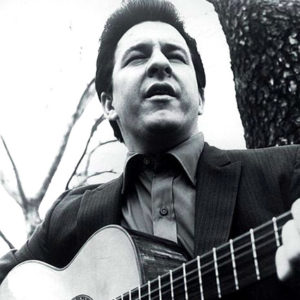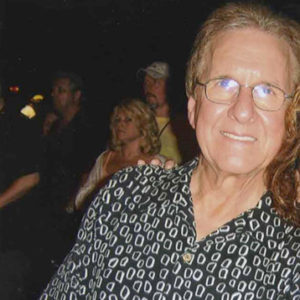calsfoundation@cals.org
Tommy Cash (1940–)
Tommy Cash is a musician and the younger brother of country music legend Johnny Cash. Although he was raised in Arkansas, he got his musical start in Tennessee—first in Memphis and later as part of the Nashville establishment. Often employing the familiar country music themes of Christianity, the blue-collar lifestyle, and patriotism, he has had numerous hit albums and songs throughout his career, among them the singles “Six White Horses,” “Rise and Shine,” and “One Song Away.” He continues to play music and give interviews about his career and life in the Cash family.
Tommy Cash was born on April 5, 1940, in Dyess (Mississippi County) to Ray and Carrie Cash, both of whom were Arkansas natives; he was the youngest of seven children. Growing up in Dyess, Cash worked at the movie theater as a projectionist and played for his junior high school basketball team. Cash excelled on the court, making the All-State team. With the help of his coach Tom Parks, whom he idolized, he led his high school team to the state championship. For a time, Cash considered becoming a professional basketball coach. As an adult, he became an avid golfer.
Cash moved with his family to Memphis in 1956 and continued playing basketball. He also worked as a disc jockey at KWAM. After graduating from Memphis Treadwell High School, Cash—as his brother Johnny had before him—served in the military in Germany. He worked as a disc jockey on his show, “Stickbuddy Jamboree,” for Armed Services Radio in Frankfurt. When he returned from overseas, he worked in a Dyess store as a clerk. Cash’s reserve unit was soon called to active duty, and he served again, working for Armed Services Radio in North Carolina. By 1963, Cash had settled in Nashville, where he worked in the publishing business. In January 1965, Cash recorded his first single, “I Guess I’ll Live,” for his label, Musicor. Later, he moved to Epic Records.
Johnny Cash’s success as a musician had a great effect on his younger brother. “I probably would have never learned to play the guitar if it wasn’t for him,” Tommy Cash has said of his brother. He recalled that as a teenager in 1956 he made several hundred dollars selling photographs of Johnny Cash at a concert. As an adult, however, Tommy Cash had to deal with Johnny’s drug addiction and violent behavior. In 1964, he set up offices for JC Music and South Wind Music in Nashville, but he quit because his brother would wreck the offices when no one was there. Three years later, a strung-out Johnny, who had been acting erratically on a flight, struck Tommy in the face in a Memphis airport.
On August 18, 1961, Cash married Barbara Ann Wisenbaker, whom he met while serving overseas, and had two children with her. The couple divorced in 1975. He married Pamela Yvonne Dyer on March 12, 1978. They also divorced. When he was recovering from the breakup of his first marriage, Cash—as his brother had—sought the help of evangelist Billy Graham for spiritual comfort.
In 1969, Cash recorded his biggest hit single, “Six White Horses” (written by Larry Murray), inspired by the memory of John F. Kennedy, Robert Kennedy, and Martin Luther King Jr. The single went to number four on the U.S. country charts. The album of the same name, released in 1969, broke the U.S. country Top 20. In 1970, Tommy Cash’s religiously inspired “Rise and Shine” was enjoying greater success than his brother’s “What is Truth.” His “One Song Away” and “The Tears on Lincoln’s Face” also sold well. In the 1970s, other hits would follow for Cash and his band, the Tomcats.
Although his relationship with Johnny was at times strained, Tommy Cash and his brother stayed close. In 1976, Johnny asked Tommy to tour with him in honor of the American Bicentennial. The brothers played roughly 120 shows together; these included a concert in March in Cleveland County, where Johnny was born. Tommy Cash later toured with Hank Williams Jr., Connie Smith, and George Jones. In 1992, Cash was asked to work as a promoter for a proposed Johnny Cash Theatre in Branson, Missouri, but the venture was abandoned due to lack of funding. Since Johnny Cash’s death, Tommy Cash has honored him in concert by performing his classic hits. He has also issued such albums as a Tribute to My Brother (2004) and Fade to Black:Memories of Johnny (2008).
Critics have not always been kind to Tommy Cash. Author Tom Wolfe once described him as “one of those garrulous country boys who has a big red barn full of cornball personality in an ordinary conversation.” Norman Johnson, a manager and club owner, has been kinder, calling Cash “one of the nicest guys and most admired artists in Nashville,” adding that he is “a master of his craft and a true credit to country music.” Cash himself is modest about his career, saying, “I’ve had more success than I deserve.” In 2009, the governor of Tennessee made Cash an honorary colonel in the Tennessee National Guard for his contributions to his adopted home state.
Cash lived for many years in Hendersonville, Tennessee, with his wife, Marcy Benefield Cash, whom he married in 2001; he currently lives in Gallatin, Tennessee.
For additional information:
Haymes, Charles. “Tommy Cash to Perform at White County Fair in Searcy.” Cabot Star Herald, September 15, 2004, p. 7B.
Johnson, Norman. I Forgot to Forget to Remember. N.p.: Xlibris, 2012.
Miller, Stephen. Johnny Cash: The Life of an American Icon. New York: Omnibus Press, 2003.
Waddell, Hugh. I Still Miss Someone: Friends and Family Remember Johnny Cash. Nashville, TN: Cumberland House, 2004.
Wolfe, Tom. Mauve Gloves and Madmen, Clutter and Vine, and Other Stories, Sketches, and Essays. New York: Farrar, Straus and Giroux, 1976.
Colin Edward Woodward
Center for Arkansas History and Culture
 Divergent Prosperity and the Arc of Reform, 1968–2022
Divergent Prosperity and the Arc of Reform, 1968–2022 Tommy Cash
Tommy Cash  Tommy Cash
Tommy Cash 




Comments
No comments on this entry yet.